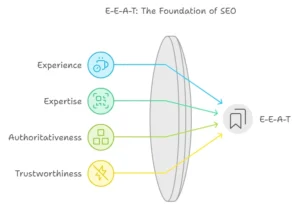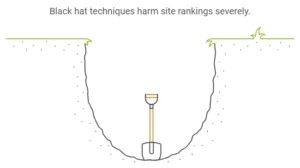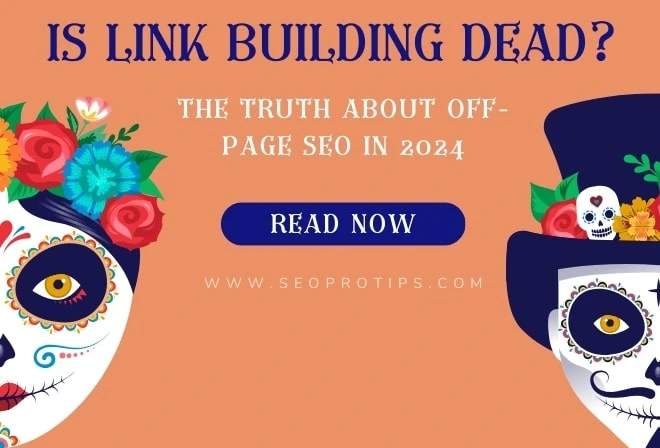Introduction
“If you build it, they will come,” said Kevin Costner in Field of Dreams. The same holds true for SEO: if you build the right strategy, including off-page efforts like link building, your audience will come. But is link building still an essential part of SEO in 2024? The question keeps popping up: “Is link building dead?”
In this article, we’ll explore the truth about link building and its role in off-page SEO in 2024, clearing up common misconceptions, discussing the future of SEO strategies, and explaining the role of E-E-A-T (Experience, Expertise, Authoritativeness, and Trustworthiness) in link building.
What is Link Building?
Link building refers to acquiring hyperlinks from other websites to your own. These links act as votes of confidence, signaling to search engines like Google that your content is credible and valuable.
A Brief History of Link Building
Back in the early 2000s, link building was the backbone of SEO. More links meant better rankings. However, Google’s algorithm has evolved over time, and today, it prioritizes the quality of links over quantity.
“The objective is not to ‘make your links appear natural’; the objective is that your links are natural.” — Matt Cutts, former head of Google’s web spam team
The Role of Link Building in SEO

How Link Building Helps with Ranking
Backlinks remain a significant factor in SEO. High-quality backlinks from reputable, authoritative sites signal to Google that your website provides value. This can improve your rankings, which translates to more visibility, traffic, and potential conversions.
Common Misconceptions About Link Building
The “Link Building is Dead” Myth
One of the most persistent myths is that link building is dead. This notion stems from changes in Google’s algorithm, which have penalized manipulative linking practices. However, link building is far from obsolete; it’s simply evolved into a more refined practice.
“SEO is not something you do anymore. It’s what happens when you do everything else right.” — Chad Pollitt, author and co-founder of Relevance
Google’s Stance on Link Building in 2024
Google’s Algorithm and Link Signals
Google continues to place a high value on backlinks, but the emphasis is on relevancy and quality rather than sheer numbers. A link from an authoritative, industry-relevant website carries more weight than dozens of links from random or low-quality sites.
Off-Page SEO: Beyond Link Building
Link building is a crucial part of off-page SEO, but it’s not the only component. Off-page SEO includes other activities that contribute to your site’s authority and trustworthiness.
What Is Off-Page SEO?
Off-page SEO involves actions taken outside your website that help improve its ranking. This includes building backlinks, but also encompasses activities like social media engagement, influencer outreach, and brand mentions.
Social Signals and Brand Mentions
Social signals, such as likes and shares, indirectly contribute to SEO by increasing visibility and driving traffic. Brand mentions, even without a hyperlink, can also help search engines gauge your site’s authority.
Does Link Building Still Matter in 2024?
Evolving Tactics for Link Building
Yes, link building still matters in 2024. However, the tactics used today focus on earning high-quality, relevant backlinks rather than just collecting as many links as possible.
The Role of E-E-A-T in SEO

What is E-E-A-T?
E-E-A-T stands for Experience, Expertise, Authoritativeness, and Trustworthiness. This concept is a cornerstone of Google’s Search Quality Evaluator Guidelines and has a significant impact on how websites are evaluated, especially when it comes to SEO and link building.
- Experience: Does the content creator have firsthand experience in the subject matter?
- Expertise: Is the content creator an expert in the field?
- Authoritativeness: Is the website recognized as a go-to source in its niche?
- Trustworthiness: Can the website and content be trusted for accurate, reliable information?
How E-E-A-T Affects Link Building and SEO
E-E-A-T is vital when building links. Backlinks from authoritative, trustworthy sources boost your E-E-A-T, which can significantly enhance your website’s credibility and rankings. Conversely, links from dubious or irrelevant sources can damage your E-E-A-T and harm your SEO.
“The way to build your authority is to prove your expertise and reliability consistently over time.” — Neil Patel, SEO expert and co-founder of Neil Patel Digital
Types of Link Building in 2024
Different methods of link building remain effective in 2024:
Guest Posting
Guest posting on reputable websites can still drive valuable backlinks to your site, as long as the content is relevant and adds value to the audience.
Broken Link Building
This tactic involves finding broken links on other websites and suggesting your own content as a replacement. It’s a mutually beneficial strategy that can earn you high-quality backlinks.
Digital PR and Link Outreach
In 2024, digital PR is one of the most effective link-building strategies. By creating shareable, newsworthy content, you can attract attention and backlinks from high-authority websites.
The Risks of Poor Link Building Practices
Black Hat Link Building Techniques to Avoid

Avoiding black hat techniques is more important than ever. Practices like buying links or using link farms can lead to penalties from Google, severely impacting your site’s rankings.
The Importance of Relevancy in Link Building
Building Links from Authoritative Sources
Relevance and authority are key in link building. A single backlink from a reputable, industry-specific website can be more valuable than multiple links from unrelated or low-authority sites.
How to Build Links the Right Way in 2024
Focus on Quality, Not Quantity
The focus in 2024 should be on earning high-quality backlinks from authoritative sites within your industry. This requires creating valuable content and building relationships with key players in your niche.
Alternative Off-Page SEO Strategies
While link building is crucial, there are other off-page SEO strategies that can also help improve your site’s ranking and authority.
Leveraging Influencer Marketing
Collaborating with influencers in your industry can help you build your brand and earn valuable backlinks. Influencers often have a loyal following, which can lead to increased visibility and authority.
Building Online Communities
Fostering online communities around your brand can help drive organic traffic and build authority. Platforms like forums, Facebook groups, or even Reddit can be great ways to engage with your audience.
Link Building Tools for 2024
Tools for Identifying Backlink Opportunities
Several tools can help you identify potential backlink opportunities. Here’s a quick comparison of some popular options:
| Tool | Features | Best For |
| Ahrefs | Backlink analysis, competitor insights | Advanced SEO and link building |
| SEMrush | Keyword research, backlink opportunities | Comprehensive SEO strategy |
| Moz | Link tracking, domain authority metrics | Monitoring link health |
| Majestic | Historical backlink data, link intelligence | Deep backlink profile analysis |
Tools for Monitoring Backlink Health
Monitoring your backlinks is crucial to ensure they remain healthy and relevant. Tools like Moz and Majestic can help track your link profile and alert you to any issues.
Conclusion: Is Link Building Dead?
The answer is clear: no, link building is not dead. In fact, it’s more important than ever, but it requires a smarter, more ethical approach. Quality over quantity is the name of the game in 2024. Backlinks from relevant, authoritative sites continue to be a critical ranking factor, making them an essential part of any successful SEO strategy.
FAQs
- What is the difference between on-page and off-page SEO?
On-page SEO refers to optimizing elements on your website, while off-page SEO focuses on activities outside your website, such as link building and social media marketing. - Is link building still effective in 2024?
Absolutely! Link building remains an essential part of SEO, but the focus has shifted to earning high-quality, relevant backlinks. - What is E-E-A-T in SEO?
E-E-A-T stands for Experience, Expertise, Authoritativeness, and Trustworthiness. It’s a critical component of Google’s ranking criteria, especially in evaluating the quality and credibility of content and backlinks. - What are black hat link-building techniques?
Black hat techniques include buying links, using link farms, and engaging in spammy link exchanges. These practices can result in penalties from Google. - Can social media affect off-page SEO?
While social signals don’t directly impact SEO, they can drive traffic and boost visibility, contributing to your overall online authority.

